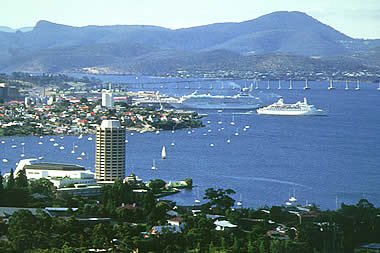Nielsen Media has abandoned the Hobart survey, which was due out today. Nielsen’s Peter Cornelius has told radioinfo: “We decided not to release it because it was not sufficiently representative of the Hobart population.”
Cornelius says the mood in Hobart was more of disappointment than criticism about the decision, which was taken in conjunction with the industry auditor and stations in the market. “There was a level of market expectation for a survey after so many years, so we had to explain it.”
The decision was made because the survey did not gather enough responses from under 40 year olds to make the results valid. “Those aged 55+ were over sampled and those under 40 were undersampled,” explains Cornelius, who hopes there will be another survey some time next year. The flawed results have not been released publicly, nor privately to stations.
Gil Sellars, General Manager of 7HO has told radioinfo:
“We have been working very hard for the last twelve months to rebuild the station and turn it back to where it was over 15 years ago, as Hobart’s No1. Our audience has happily joined us on the journey. The feedback has just been fantastic.
With a high class product it was devastating to find out what happened. It is beyond belief that we get to find out just hours before the result was to be released that it was a non survey. Full credit to everyone here for doing such a great job……..our dedicated professional team will just keep on delivering great content. Top job Mark Wiggett in leading the charge.”
Sea/Heart FM GM Damon Wise has told radioinfo: “We’re disappointed with the circumstances surrounding this survey – Hobart’s first in nine years. To not get a result is a bit like a drawn grand final. Our teams have worked extremely hard in 2011 and we are now looking forward to 2012 and the next survey.”
It would have been impossible to anticipate the problem in advance according to Cornelius, who says there are “lots of variables involved, you can’t tell the outcome until all the results have been processed.”
The nature of the Hobart market made the recruitment, compliance and completion of surveys difficult to manage. “Because there has not been a survey there for ten years we don’t have staff in the field in Hobart, so we recruited people by telephone, sent them the diaries, then relied on them to send them back to us. When we processed the data we found that it was not representative of the population… The data did not meet our high professional standards, the randomness was not acceptable.”
Nielsen used the ‘household flooding’ method for this smaller market, where a whole household agrees to participate. This method has been discarded for larger markets in favour of a ‘single person’ methodology that recruits individuals and therefore gives is more control of the demographic segments. The sample size was 1200 people.
There are three major radio groups in the market which participate in the surveys: Grant Broadcasters, owner of 7HO FM, Austereo Southern Cross, owner of Sea and Heart FM, and the ABC. All stations in the market had been very active during the 9 week survey period (see earlier story).
One radioinfo source, who did not wish to be named, said: “How come they didn’t check at a midpoint and let us know in advance what might happen.” Another insider said: “A lot of money has been pissed up against a wall in promotions and visibility. Someone’s got to take responsibility.”
The last Hobart survey was conducted back in 2002. See our coverage of that survey here. At that time we reported:
The biggest winner in the survey was TTT FM, which increased by 3.8 share points, while HO FM suffered the biggest drop, losing 6.3 share points. ABC 936 took the top spot from former leader HO FM, up by 1.5 share points to 22.3% overall.
Whether or not Hobart does get another survey next year will depend on negotiation with the players in the market. Because of the proximity to Christmas, Cornelius says it would not have been practical to extend the survey and keep gathering data until the right balance of demographics had been found.
It is becoming more difficult to get younger audiences to participate in surveys these days, according to Peter Cornelius, a trend also confirmed recently by Matt Balogh of rival survey company McNair Ingenuity (see our earlier story).
Would electronic people meter measurement prevent this problem? Cornelius is skeptical. “Electronic measurement would have been even be more difficult. It has to do with the nature of the sampling… Cost is an issue, electronic measurement would cost far in excess of what they would be willing to fund… Compliance could also be an issue, filling in a diary for a week is not onerous, but carrying device might be.”


Maybe (apart from PPM)the industry should creatively think about utilising social media surveys for radio listening measurement. After all, more people are online and listening online, so perhaps using Twitter, Facebook, Google, Linkedin etc. to guage 'who' is listening to 'what' could be a more contemporary and practical alternative ? No point hanging on to past methods if the Tasmanian experience is a sign of things to come. Also in Tassy, The Greens would no doubt be concerned about old school 'paper' diaries,not to mention possible 'health issues' (real or not) of carrying an electronic device on the bod for a week ! Thinking further outside the square, I wonder if satellite technology could be an answer to tap into our listening habits ?, privacy issues sorted first ! Regards, IAN, Victor Harbor SA